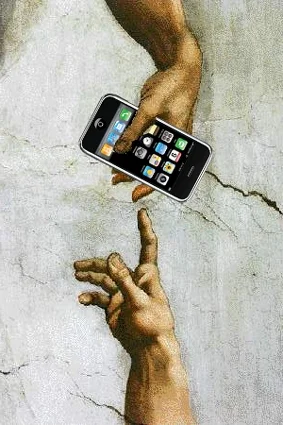“I’m going to put on my gravestone, ‘He never owned a cell phone.’”
iPhone Addicts R Us.
Gallup found that about half of smartphone users check their phones several times an hour or more frequently; 81% of people said they keep their phones near them “almost all the time during waking hours” and 63% do so even when they’re sleeping. The condition is especially severe among the young, one-in-five of whom cop to “checking their phone every few minutes.”
In a 2015 study conducted at the University of Missouri, media researcher Russell Clayton found evidence that some people feel their phones are part of them—kind of like a leg or an arm. In a clever ruse involving word search puzzles and a blatant lie about signal interference, Clayton was able to get a snapshot of about 40 college students’ physiological states when their iPhones started ringing across the room but they were unable to answer them.
“They reported feeling a loss of identity,” he says. “When objects become possessions, when we use them a lot, they’re potentially capable of becoming an extension of ourselves.” When digital natives born today grow up to be toddlers who are crying because a parent takes their iPad away, Clayton says that could leave us with interesting questions: “Are they upset because they can’t play their game? Or are upset because they don’t have the iPad, the object, the possession?”
The good news is that Rosen does have a plan: weaning off devices bit by bit and making a public statement that you’re going to do so. This second part is key. Only if you’ve warned your parents and friends that they shouldn’t take it personally when you don’t text them back or like their picture right away, he says, will you be able to actually relax, no longer in fear of offending anyone who expects you to be on all the time. Meanwhile, you must wage an internal battle against your own FOMO.
“You announce to the world that you’re only going to check your phone once a half hour,” he says, “and then you allow yourself a minute or two every half hour to check in, return a call, text back, and then turn it off and put it away.” Then perhaps get bold and go up to an hour. Then perhaps two hours, in an attempt to eventually make the phone less like the limb it has become and more like the really cool toaster it could be.
“A lot of it,” Rosen says, “is self-induced anxiety.
From Time.
Here are five tips to manage your phone addiction:
1. The first 30 minutes of your day
If you find yourself waking up in the morning reaching to check in with your phone before you even got out of bed, this is a serious problem. The first 30 minutes upon awakening should be dedicated to creating a good start to your day. This means getting out of bed, freshening up, taking 5 minutes to meditate and stretch and preparing a healthy breakfast. Start your day doing healthy, positive things to build your inner fortitude to take on the day ahead.
2. Create No-Phone Time Zones
The truth of the matter is having a cell phone close by at work is common, and sometimes even required. Whether the ding of your phone is work-related or not—that specific phone alert is rarely related to the current work at hand. If you are constantly getting distracted by your phone going off—you won’t remain focused on the work in front of you, decreasing productivity. Therefore, I advocate for creating a no-phone time-zone. This means that for at least 2 hours of your day(when you’re most productive work happens) you close off your phone and stay completely dedicated to the work in front of you.
3. Turn your Phone Off When You Get Into The Car
This should be a law. I’m waiting for the day that it is. Just as in an aircraft you are asked to power off your electronic devices and cell phones, this should be the law of the road. It is impossible for your mind to be at two places at once. It is a law of physics: no one thing can occupy the same space at the same time, and if your mind and eyes are on your phone, they are not on the road. Driving is one of those places where you do not want to mess around. Sometimes I hear the excuse “Well, I need my phone for directions, my GPS is on it.” To that I say: what did people do five years ago? You would carefully map out your route before you left the house, or you would pull off to the side of the road as you looked at a map. The same rule should apply today. When driving—close off your phone so that you are not even tempted to look at it. Your life and other people’s lives are at stake.
4. Get Real
When you are with a real life person sharing a conversation, a meal, or a cup of coffee, they are a real life form. A real person right there in front of you to engage with. Are you telling me that your virtual friends and virtual text conversations are more important than the real life person in front of you? Not only is this THE rudest thing on the planet, but it breaks down friendships and can ruin relationships. Even if you say to a friend “Oh I just need to check that,” They may respond “Oh, that’s OK.” But the truth is it’s not OK. What you are saying is that the virtual message is more important than them. They have taken time out of their busy life to meet with you, and share real life time with you. By turning your attention away from them you are inevitably saying “You are not as important.” It’s really a sickness that we are so addicted to our phones that we ignore the people we are with to hang out with virtual people over Facebook, Twitter, and text messages. Come on people—it’s time to get real.
5. Don’t Lose Sleep Over It
If you find yourself up late at night playing on your phone, whether it is video games, Facebook, or text messaging, you are losing precious sleep over your addiction. The moment you stop putting energy into caring for your basic needs and pour your time and energy into your phone, you are allowing the phone to dictate your health and well-being. If you catch yourself in this scenario, my advice is to power off your phone an hour before bedtime to ensure that your last hour is spent in a meaningful way, and that you get to bed on time to start the next day afresh. Your phone is just not worth losing sleep over.
From LifeHack




